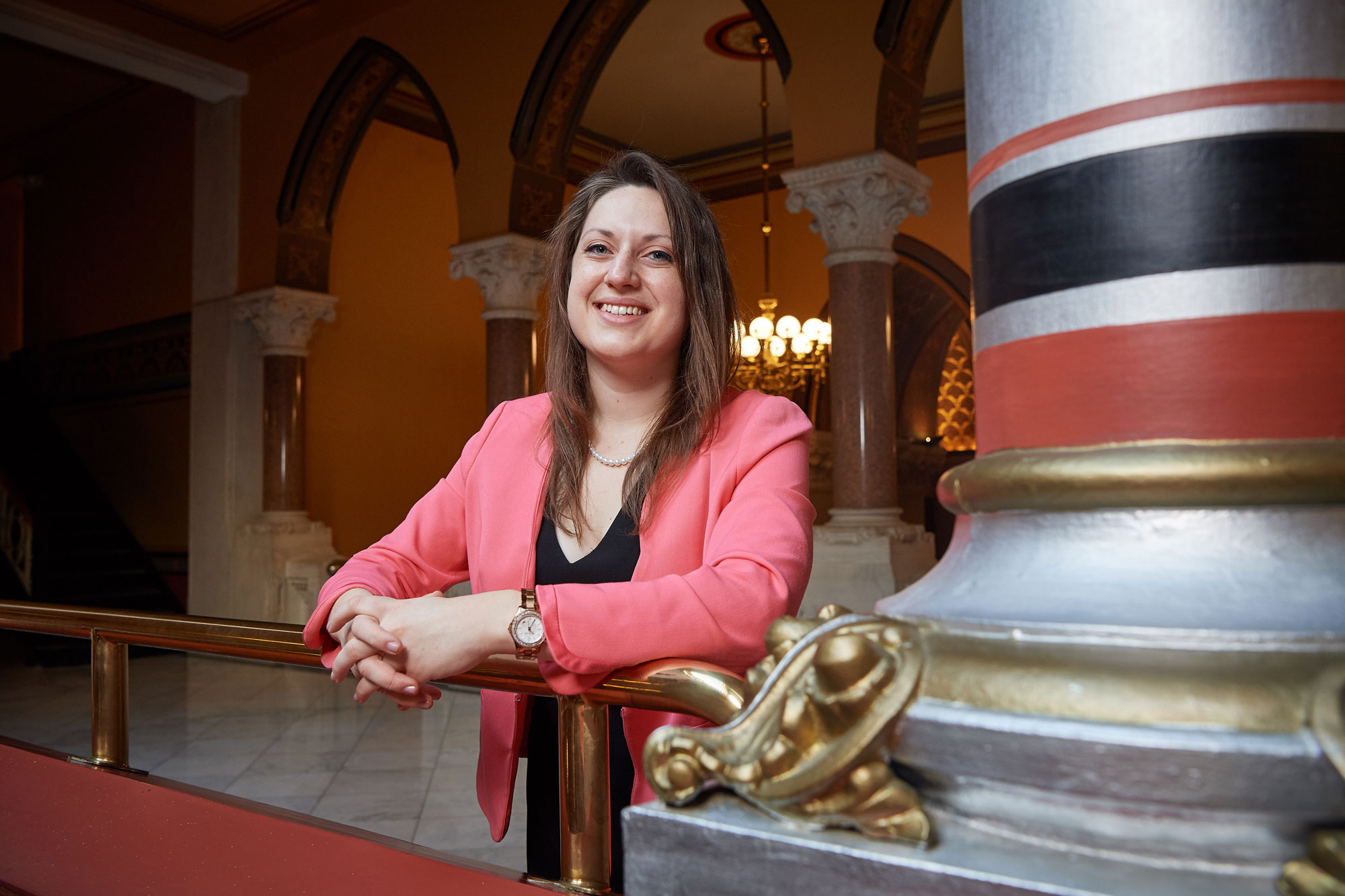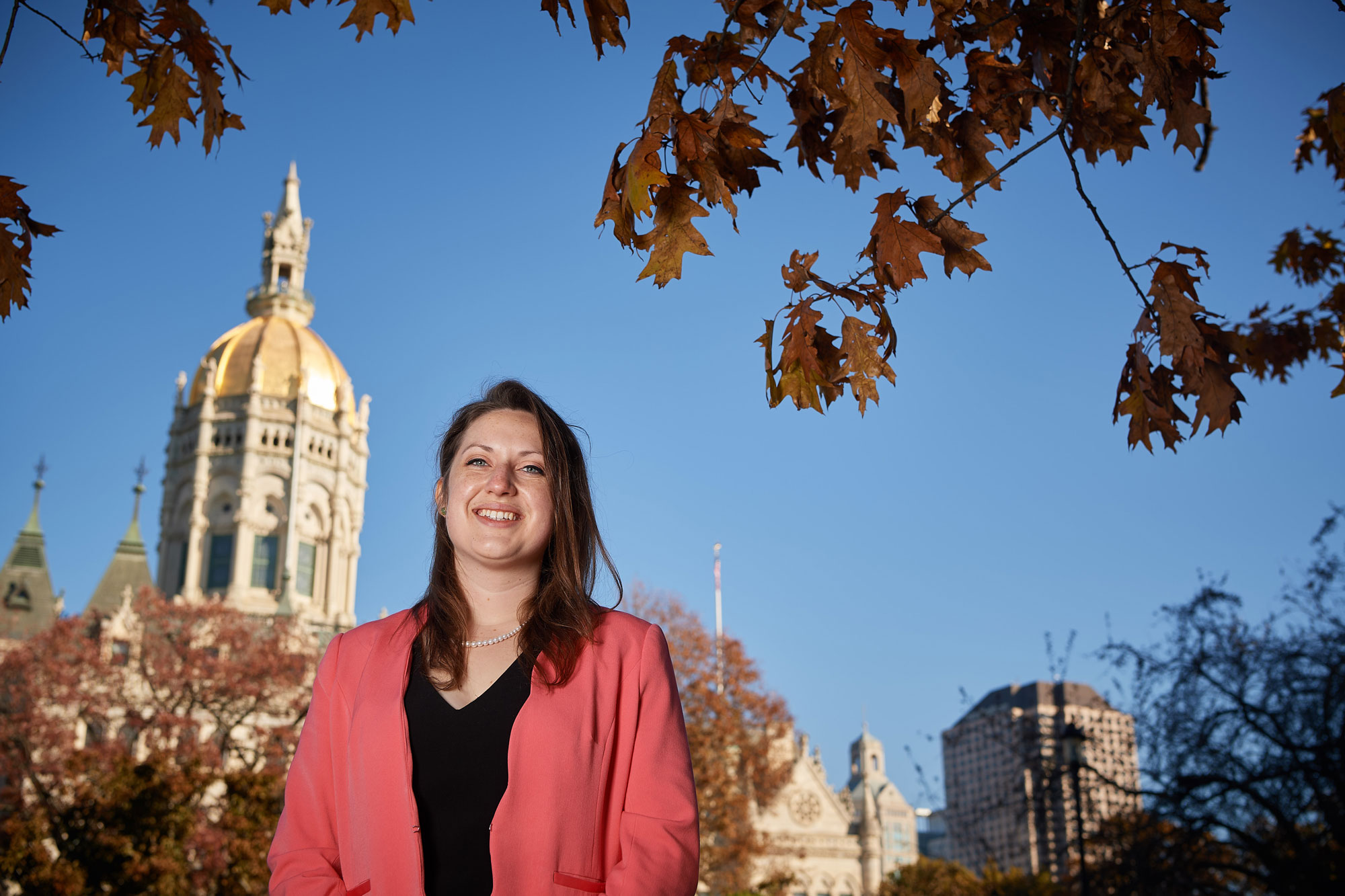Elizabeth Charash '18 (CLAS)
When this Newtown, Connecticut, native was in high school, terror struck her hometown. Now a senior majoring in history with minors in public policy and human rights, she's committed to preventing gun violence.

Elizabeth Charash '18 (CLAS)
When this Newtown, Connecticut, native was in high school, terror struck her hometown. Now a senior majoring in history with minors in public policy and human rights, she's committed to preventing gun violence.
Why did you choose to come to UConn?
I applied and got into the Special Program in Law. I was like, "I'm in law school!" And my mother's like, "Rein it in, Elizabeth, rein it in." It was really the Special Program in Law and the Honors Program that made UConn so attractive. I think they're some of the best assets this university has, but of course I'm very biased.
Tell us about interning in Washington, D.C., last summer with the Brady Campaign.
I was so lucky to have been able to work with them. The Brady Campaign is one of the oldest gun violence prevention organizations in the country and is the leader in gun violence prevention litigation. One of its big recent cases was the Florida gag rule, which prevented doctors from asking patients about guns in their homes. It's a child safety issue. The Brady Campaign and others challenged the law, and the courts overturned the gag rule. They ruled that doctors have a right to ask. It's constitutionally protected speech. That's something I never would have thought of, but the Brady Campaign went after it. It's incredible how much you can do through the courts.
Have you always been interested in public policy?
In high school I actually wanted to be an engineer. I love physics. I love looking at a problem and seeing how different rules can be applied to solve it. And then Sandy Hook happened. After Sandy Hook I started getting involved with different advocacy groups and meeting different people — victims of gun violence, people working on the issue. I read cases obsessively and realized how much impact one story can have on changing the law.
What motivated you to start the student group UConn Against Gun Violence?
I wanted to create a club to share information and points of view so that we could have a conversation. We need to look at all the different facets of gun violence. For example, we're so focused on mass shootings like Sandy Hook that we forget how many people commit suicide with handguns. Of the 34,000 gun deaths recorded every year in the United States, 21,000 are suicides. Two thirds! Why isn't this talked about more? So UConn Against Gun Violence brings in speakers who can share different experiences and areas of expertise, and this includes people who advocate for gun rights. One of the things that I really enjoy is our partnership with the UConn Pistol and Rifle Club. I know what they're saying, and they know what I'm saying, and we can have a conversation about it. It's sharing knowledge; it's saying, "Okay where's the overlap?"

Is Washington in your future?
I bought my first suit when I was in the fourth grade. You know how everyone does the bus stop photo on the first day of school? I'm in a pink blazer, skirt, and low pumps. At school they always thought I was a substitute teacher. Freshman year is probably the worst picture. My hair is slicked up into a topknot and I have a full suit with the skirt, the blazer, and black sequin flats. I was 14 and wearing campaign attire! But Washington depends. I really would like to go abroad again for a little bit.
You spent time with the UConn program in Cape Town, South Africa.
I was there from January through April in 2016, spring semester my sophomore year. I wish I could have been there longer. There's an internship and class component to the program. I was placed with an organization called Project Ceasefire, which does onsite mediation for gang violence. What's really great about Project Ceasefire is that it looks at a person holistically. It mediates gang disputes and there is a community center that runs job training programs and a substance abuse clinic. Everything is interrelated.
You must have had some memorable moments.
Something I think about frequently: I was in the community center one day when a couple came in with a baby. "We found this child in the Fields," they said. The Fields is this desolate dirt area in Hanover Park, needles on the ground, broken bottles. The director took the baby girl and made arrangements with child services. Afternoon came, a woman stumbled into the center. "I'm here for my child," she said. "You took my child." The community rallied and set the woman up in a substance abuse facility, this woman they didn't know. Everyone in the neighborhood tries to take care of one another regardless of the limited resources they have. Incredible people.
When not studying or researching gun laws or thinking about your next trip, how do you kick back? With the minute or two a day that's left?
Baking and cooking. Also, podcasts. I love "Amicus" with Dahlia Lithwick on Slate. It's all about what's going on in the courts, shockingly enough. I also recently got into "Constitutional," the Washington Post one about legal history. There's this great episode on Dred Scott. Fun fact: The very same pen that was used to write the Dred Scott majority opinion [which ruled that African Americans could not be U.S. citizens and therefore had no standing in federal court] was later used by Justice John Marshall Harlan to write his dissent to Plessy v. Ferguson. So thirty years after Dred Scott, Harlan is the only justice to stand up to segregation in Plessy, and he uses the Dred Scott pen to do it. I love little tidbits like that; that's a great podcast.
—Kevin Markey


Leave a Reply